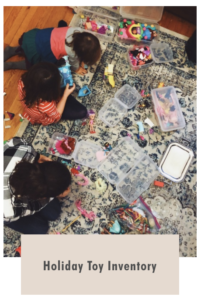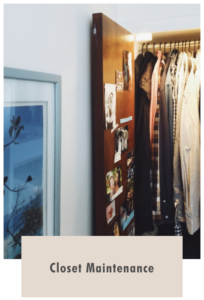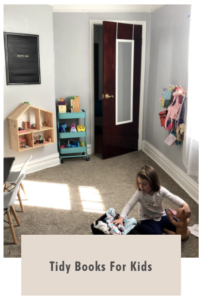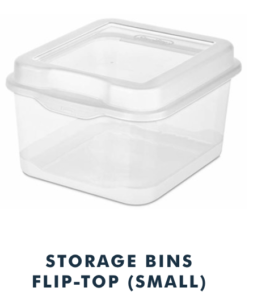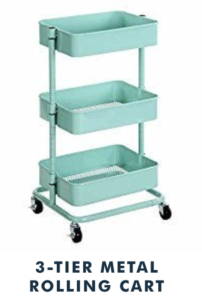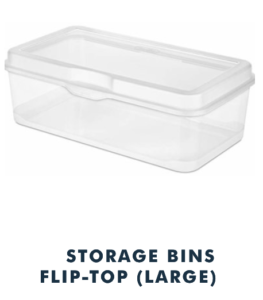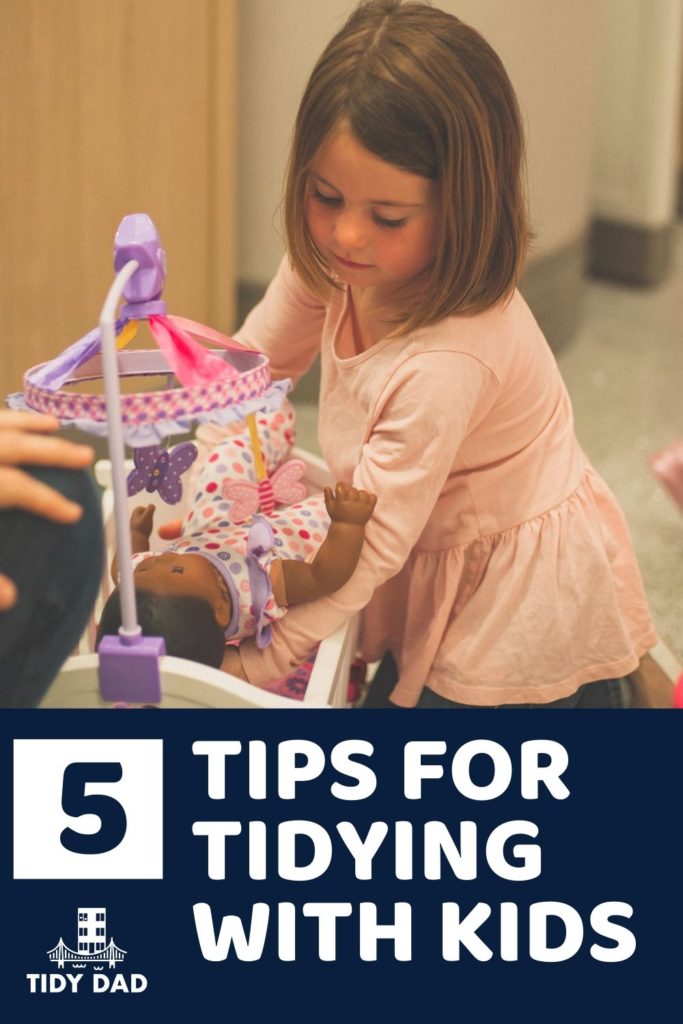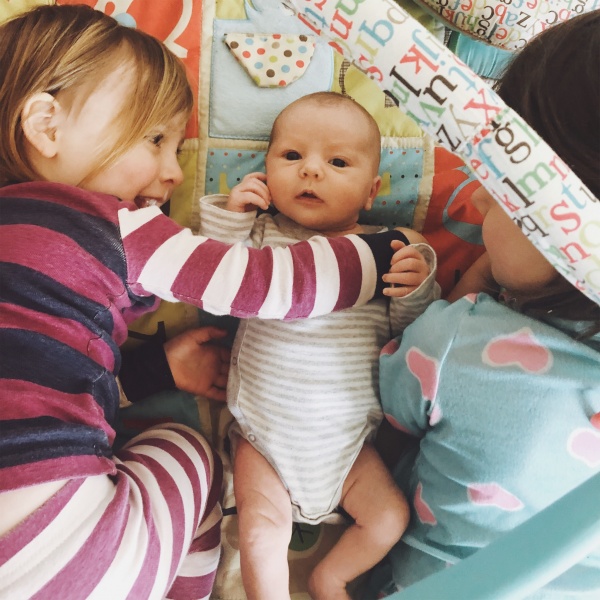
We often get questions from parents about how to get their kids to tidy up their own toys and messes. Tidying definitely doesn’t come automatically for kids. We believe that if you want your kids to tidy up their own things, you need to TEACH them how to tidy. And you also have to work to be tidy yourself! Children love to play and make messes, but they can also learn to tidy up those messes. Here are 5 tips that help keep our home tidy with three young girls, to help get you started with tidying with kids!
1. Tidy your own items first
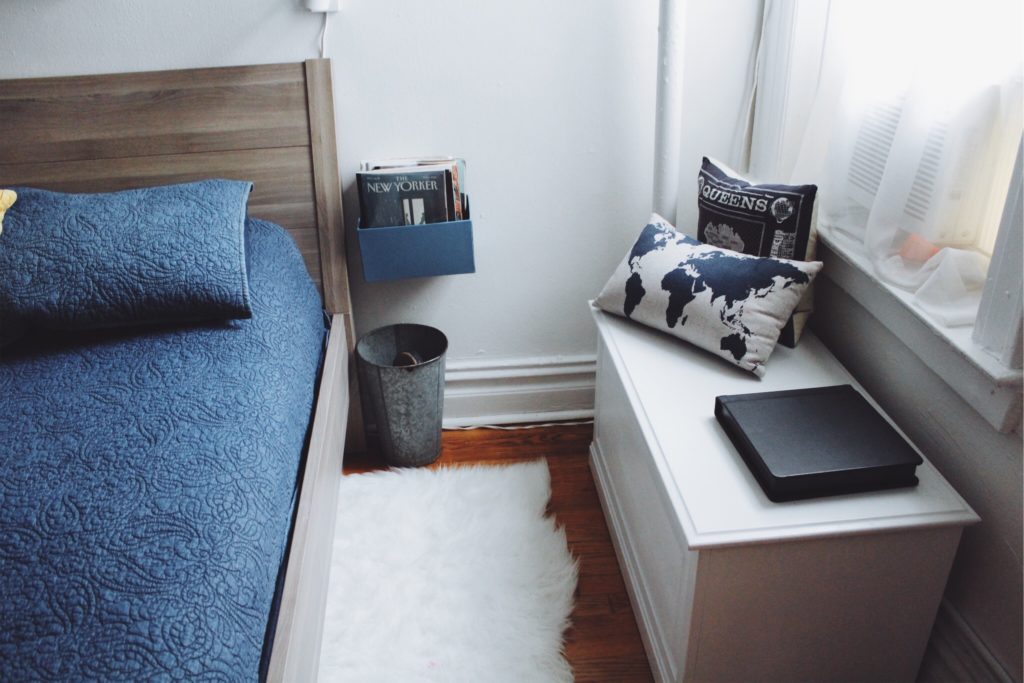
Before tidying your kids’ clothing, books, or toys, first start by tidying your own things. Emily and I started our own tidying journey by first tackling our clothing, after reading “Spark Joy” by Marie Kondo. We emptied our closets, wardrobes, and dressers. We sorted clothing items into piles. Then we chose what clothing to keep, and reorganized it into our space. Through this process we honed our decision-making abilities, learned how to set limits with the amount of clothing we were comfortable storing, and confronted our buying habits. We then tidied our books, papers, and miscellaneous items. After tidying our own items, we were ready to tackle the girls’ items.
2. Give everything a home
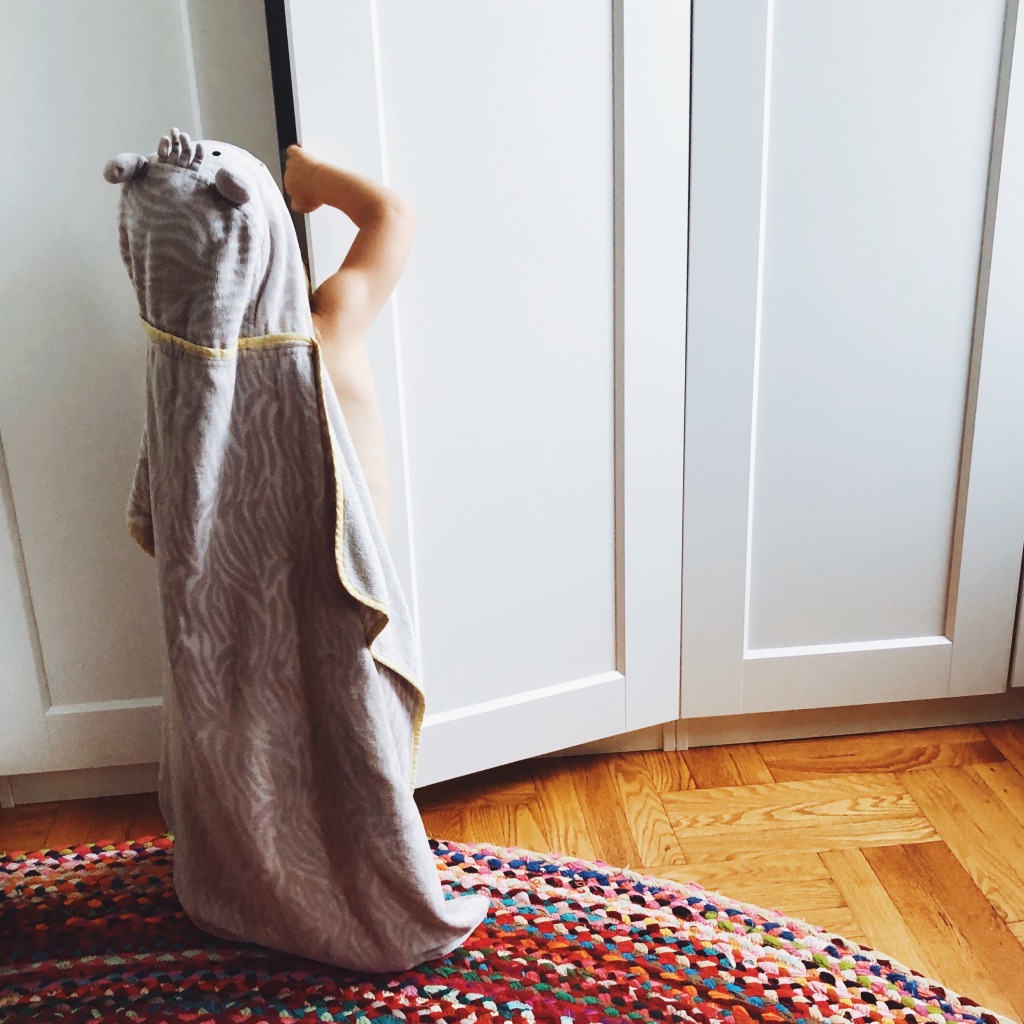
After sorting, categorizing, and choosing what items to keep, we gave everything a specific home. This included children’s clothing, books, toys, and papers. When giving items a home, we intentionally thought about the items that we wanted our girls to be able to access independently, and the items that we wanted to store out of their reach. When we found out that we were expecting our third child, we updated the girls’ bedroom. We designed a wardrobe system for the bedroom that allows the girls to independently access their clothing drawers and hanging space. We showed the girls the new storage locations for clothing, books, and toys. When tidying with kids, it’s important for them to know where everything goes, which allows them to assist with the tidying process.
3. Make daily tidying a family rhythm
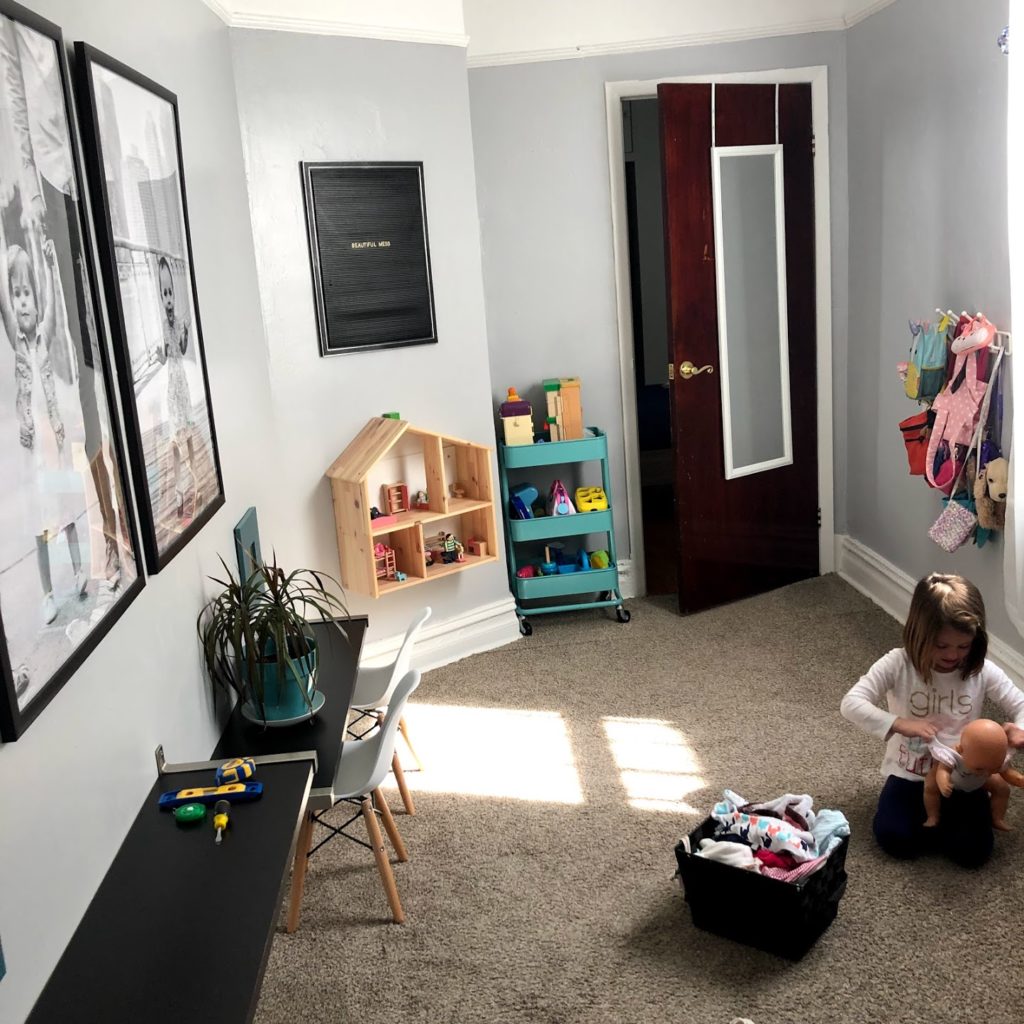
We’re committed to teaching our girls that playing and tidying are natural family rhythms. After we play with a toy, we put it away. When the girls were younger, we stored toys in the playroom in a toy storage organizer with bins so that they could see all of their toys and make choices about what they wanted to play with. The bins were small and helped us to categorize toys. Now that three girls share the playroom, we set up small containers for a toy rotation in our pantry so that they have more open floorspace to play. At the end of epic play marathons, we put on some music and work together to tidy. We talk to our girls about our feelings when toys aren’t properly cared for and when play spaces are so messy that there’s no room to play. We live in a small space, so it’s easy for our space to feel overwhelming when too many things are out at a time.
4. Gradually give kids more responsibility
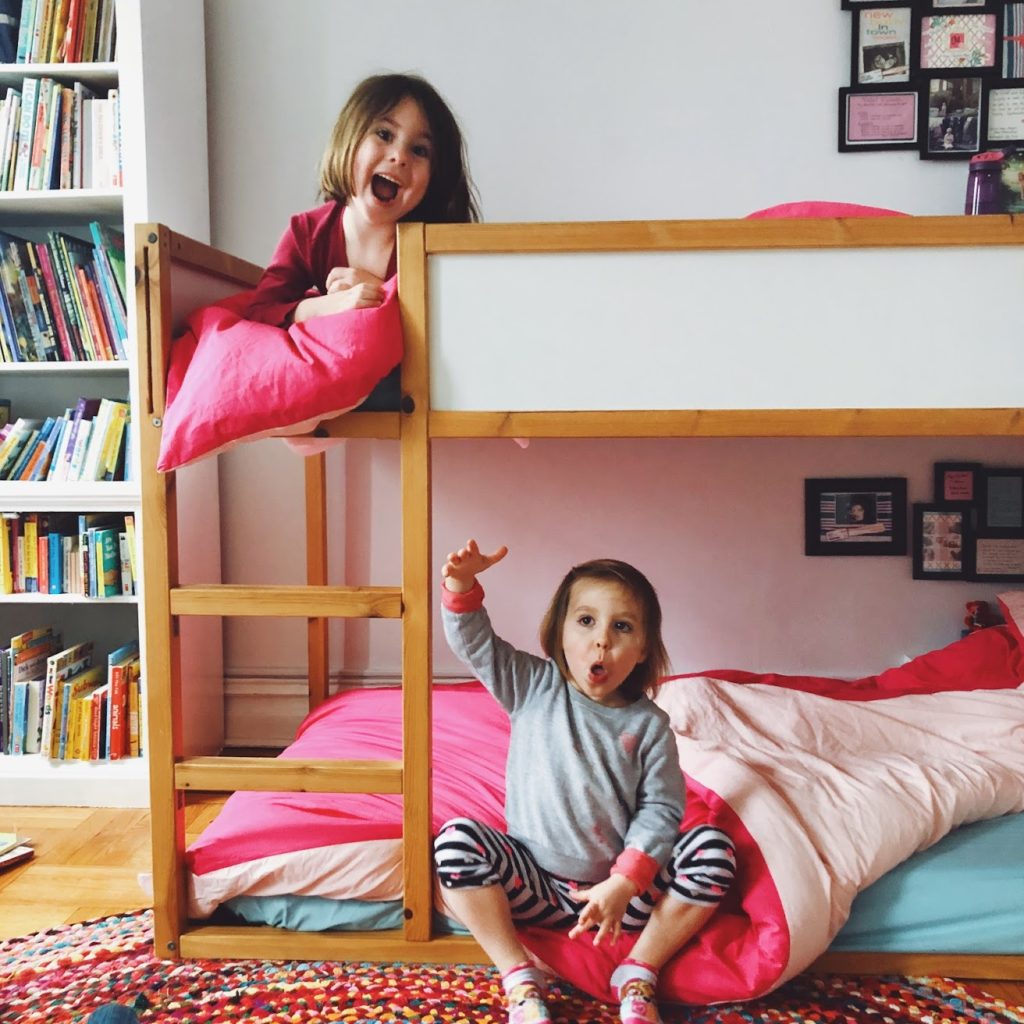
Our girls are young and are still learning what it means to tidy up a space. As they have gotten older, we’ve gradually given them more tidying responsibilities. We coach the girls to tidy up their toys after they are finished playing and assist them with tidying their playroom at the end of the day. We have a clothes hamper that is accessible to them so that after bath time they are able to put away their dirty clothes. In the kitchen, we have low drawers for their cups and plates that are accessible to them so they can help set the table before meals. We placed low hooks near the front door so the girls can independently hang their jackets and backpacks when they come inside. Kids enjoy gradually taking on more responsibilities. When tidying with kids, it’s important that organizational systems are set up to support them with their increasing independence.
5. Establish rhythms for maintaining tidiness
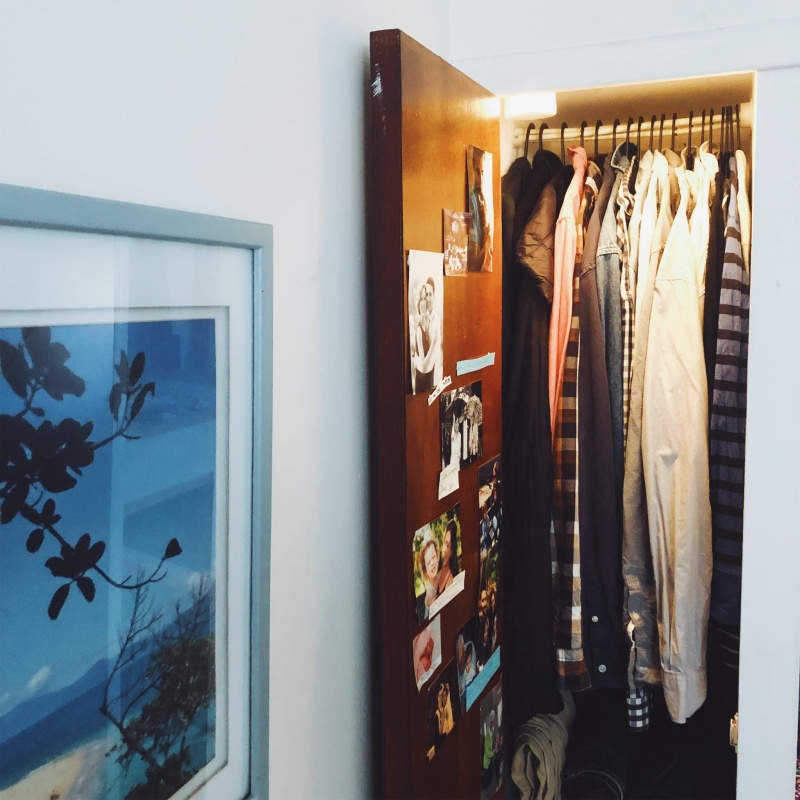
Our girls are constantly growing and changing. They will continue to need new clothing, books, and toys, but space in our home is limited. We’ve worked hard to establish organization systems that adapt to the needs of our growing family. Annually, as the holiday season draws near, we take time to do an inventory of toys. We consider the toy categories that our girls enjoy and think about additions that could meet their new developmental needs. We also do a clothing inventory at the start of each season to see what needs to be purchased.
Click HERE to read ALL of our Tidying and Organizing blogs!
Click Here for more of our Favorite Tidying Products!
_________________________________________________________________________________________
This post contains affiliate links. We may make a small commission for purchases made through these links with no additional fee to the customer. We only link to products we use and love! Thank you for supporting our blog!
Thanks for pinning!
Hi, I'm Tidy Dad!
Tyler Moore is the bestselling author of "Tidy Up Your Life" and creator of the
"Tidy Dad" Instagram, TikTok, and website. A NYC public school teacher, husband, and father of three, he’s been featured on The Today Show, Good Morning America, The Washington Post, The New York Times, HGTV, and more. Tyler lives with his wife, Emily and their daughters in Queens, NY, and spends summers at their tidy cottage in the Poconos.
April 2, 2020
5 Tips for Tidying with Kids
Browse All
parenting & Daily Living
Browse All
Tidying & Organizing
Browse All
Meal Planning & Cooking
More about tidy dad
Browse All
recipes
join over 35,000 subscribers
Subscribe to the tidy times!
Browse All
NYC Adventures
Browse All
Tidy Toolkit Resources
Order Tidy Dad's bestselling book!
join over 35,000 subscribers
Tidy Dad's monthly newsletter

We often get questions from parents about how to get their kids to tidy up their own toys and messes. Tidying definitely doesn’t come automatically for kids. We believe that if you want your kids to tidy up their own things, you need to TEACH them how to tidy. And you also have to work to be tidy yourself! Children love to play and make messes, but they can also learn to tidy up those messes. Here are 5 tips that help keep our home tidy with three young girls, to help get you started with tidying with kids!
1. Tidy your own items first

Before tidying your kids’ clothing, books, or toys, first start by tidying your own things. Emily and I started our own tidying journey by first tackling our clothing, after reading “Spark Joy” by Marie Kondo. We emptied our closets, wardrobes, and dressers. We sorted clothing items into piles. Then we chose what clothing to keep, and reorganized it into our space. Through this process we honed our decision-making abilities, learned how to set limits with the amount of clothing we were comfortable storing, and confronted our buying habits. We then tidied our books, papers, and miscellaneous items. After tidying our own items, we were ready to tackle the girls’ items.
2. Give everything a home

After sorting, categorizing, and choosing what items to keep, we gave everything a specific home. This included children’s clothing, books, toys, and papers. When giving items a home, we intentionally thought about the items that we wanted our girls to be able to access independently, and the items that we wanted to store out of their reach. When we found out that we were expecting our third child, we updated the girls’ bedroom. We designed a wardrobe system for the bedroom that allows the girls to independently access their clothing drawers and hanging space. We showed the girls the new storage locations for clothing, books, and toys. When tidying with kids, it’s important for them to know where everything goes, which allows them to assist with the tidying process.
3. Make daily tidying a family rhythm

We’re committed to teaching our girls that playing and tidying are natural family rhythms. After we play with a toy, we put it away. When the girls were younger, we stored toys in the playroom in a toy storage organizer with bins so that they could see all of their toys and make choices about what they wanted to play with. The bins were small and helped us to categorize toys. Now that three girls share the playroom, we set up small containers for a toy rotation in our pantry so that they have more open floorspace to play. At the end of epic play marathons, we put on some music and work together to tidy. We talk to our girls about our feelings when toys aren’t properly cared for and when play spaces are so messy that there’s no room to play. We live in a small space, so it’s easy for our space to feel overwhelming when too many things are out at a time.
4. Gradually give kids more responsibility

Our girls are young and are still learning what it means to tidy up a space. As they have gotten older, we’ve gradually given them more tidying responsibilities. We coach the girls to tidy up their toys after they are finished playing and assist them with tidying their playroom at the end of the day. We have a clothes hamper that is accessible to them so that after bath time they are able to put away their dirty clothes. In the kitchen, we have low drawers for their cups and plates that are accessible to them so they can help set the table before meals. We placed low hooks near the front door so the girls can independently hang their jackets and backpacks when they come inside. Kids enjoy gradually taking on more responsibilities. When tidying with kids, it’s important that organizational systems are set up to support them with their increasing independence.
5. Establish rhythms for maintaining tidiness

Our girls are constantly growing and changing. They will continue to need new clothing, books, and toys, but space in our home is limited. We’ve worked hard to establish organization systems that adapt to the needs of our growing family. Annually, as the holiday season draws near, we take time to do an inventory of toys. We consider the toy categories that our girls enjoy and think about additions that could meet their new developmental needs. We also do a clothing inventory at the start of each season to see what needs to be purchased.
Click HERE to read ALL of our Tidying and Organizing blogs!
Click Here for more of our Favorite Tidying Products!
_________________________________________________________________________________________
This post contains affiliate links. We may make a small commission for purchases made through these links with no additional fee to the customer. We only link to products we use and love! Thank you for supporting our blog!
Thanks for pinning!
April 2, 2020
5 Tips for Tidying with Kids
Hi, I'm Tidy Dad!
Tyler Moore is the creator of the “Tidy Dad” Instagram, TikTok, and website. A public school teacher in New York City, husband, and father of three young daughters, he has been featured on Good Morning America and in The Washington Post, The New York Times, New York Post, Better Homes & Gardens Secrets of Getting Organized magazine, Apartment Therapy, and many podcasts including HGTV and Minimalist Moms. During the school year, he lives with his wife, Emily, a pediatric occupational therapist, and three daughters in Queens, New York. In the summer, they spend as much time as possible in their small but tidy cottage in the Poconos.
